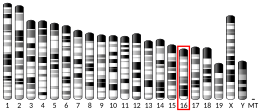RRN3
Appearance
RNA polymerase I-specific transcription initiation factor RRN3 is an enzyme that in humans is encoded by the RRN3 gene.[5][6][7]
Interactions
RRN3 has been shown to interact with TAF1B.[6]
References
- ^ a b c ENSG00000278494 GRCh38: Ensembl release 89: ENSG00000085721, ENSG00000278494 – Ensembl, May 2017
- ^ a b c GRCm38: Ensembl release 89: ENSMUSG00000022682 – Ensembl, May 2017
- ^ "Human PubMed Reference:". National Center for Biotechnology Information, U.S. National Library of Medicine.
- ^ "Mouse PubMed Reference:". National Center for Biotechnology Information, U.S. National Library of Medicine.
- ^ Moorefield B, Greene EA, Reeder RH (May 2000). "RNA polymerase I transcription factor Rrn3 is functionally conserved between yeast and human". Proc. Natl. Acad. Sci. U.S.A. 97 (9): 4724–9. doi:10.1073/pnas.080063997. PMC 18300. PMID 10758157.
- ^ a b Miller G, Panov KI, Friedrich JK, Trinkle-Mulcahy L, Lamond AI, Zomerdijk JC (Mar 2001). "hRRN3 is essential in the SL1-mediated recruitment of RNA Polymerase I to rRNA gene promoters". EMBO J. 20 (6): 1373–82. doi:10.1093/emboj/20.6.1373. PMC 145519. PMID 11250903.
- ^ "Entrez Gene: RRN3 RRN3 RNA polymerase I transcription factor homolog (S. cerevisiae)".
Further reading
- Maruyama K, Sugano S (1994). "Oligo-capping: a simple method to replace the cap structure of eukaryotic mRNAs with oligoribonucleotides". Gene. 138 (1–2): 171–4. doi:10.1016/0378-1119(94)90802-8. PMID 8125298.
- Bonaldo MF, Lennon G, Soares MB (1996). "Normalization and subtraction: two approaches to facilitate gene discovery". Genome Res. 6 (9): 791–806. doi:10.1101/gr.6.9.791. PMID 8889548.
- Suzuki Y, Yoshitomo-Nakagawa K, Maruyama K, Suyama A, Sugano S (1997). "Construction and characterization of a full length-enriched and a 5'-end-enriched cDNA library". Gene. 200 (1–2): 149–56. doi:10.1016/S0378-1119(97)00411-3. PMID 9373149.
- Bodem J, Dobreva G, Hoffmann-Rohrer U, Iben S, Zentgraf H, Delius H, Vingron M, Grummt I (2000). "TIF-IA, the factor mediating growth-dependent control of ribosomal RNA synthesis, is the mammalian homolog of yeast Rrn3p". EMBO Rep. 1 (2): 171–5. doi:10.1038/sj.embor.embor605. PMC 1084264. PMID 11265758.
- Yuan X, Zhao J, Zentgraf H, Hoffmann-Rohrer U, Grummt I (2002). "Multiple interactions between RNA polymerase I, TIF-IA and TAF(I) subunits regulate preinitiation complex assembly at the ribosomal gene promoter". EMBO Rep. 3 (11): 1082–7. doi:10.1093/embo-reports/kvf212. PMC 1307603. PMID 12393749.
- Zhao J, Yuan X, Frödin M, Grummt I (2003). "ERK-dependent phosphorylation of the transcription initiation factor TIF-IA is required for RNA polymerase I transcription and cell growth". Mol. Cell. 11 (2): 405–13. doi:10.1016/S1097-2765(03)00036-4. PMID 12620228.
- Mayer C, Zhao J, Yuan X, Grummt I (2004). "mTOR-dependent activation of the transcription factor TIF-IA links rRNA synthesis to nutrient availability". Genes Dev. 18 (4): 423–34. doi:10.1101/gad.285504. PMC 359396. PMID 15004009.
- Philimonenko VV, Zhao J, Iben S, Dingová H, Kyselá K, Kahle M, Zentgraf H, Hofmann WA, de Lanerolle P, Hozák P, Grummt I (2004). "Nuclear actin and myosin I are required for RNA polymerase I transcription". Nat. Cell Biol. 6 (12): 1165–72. doi:10.1038/ncb1190. PMID 15558034.







